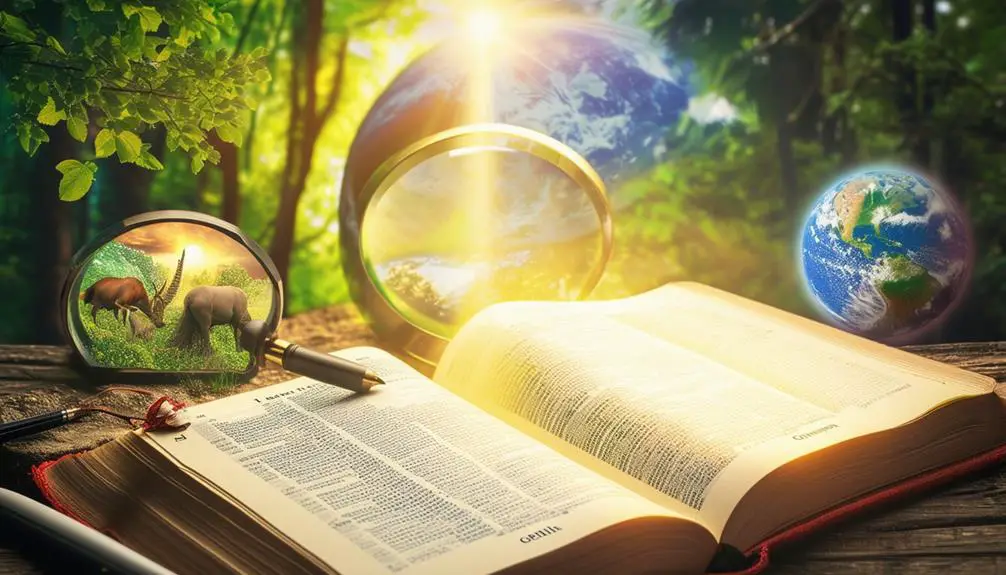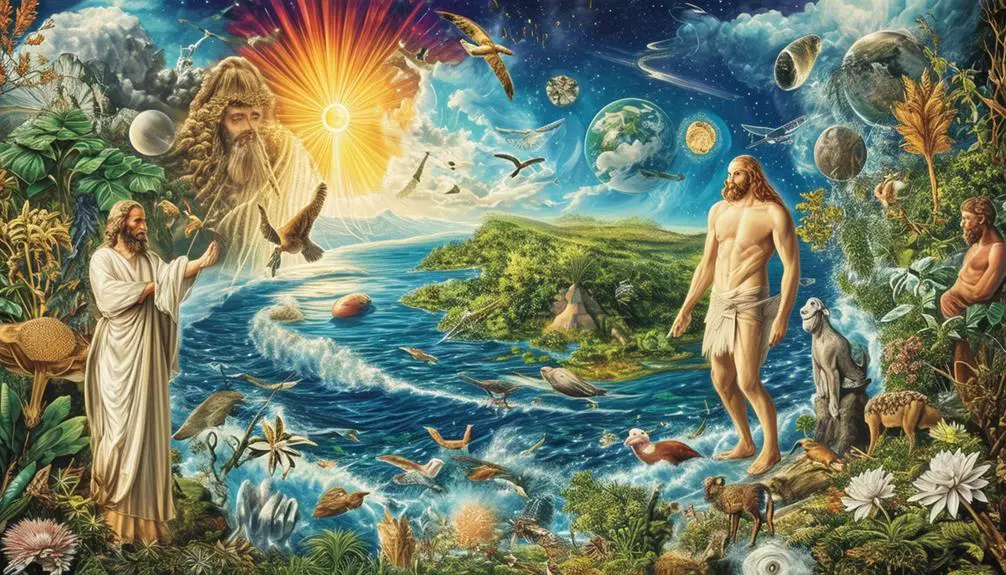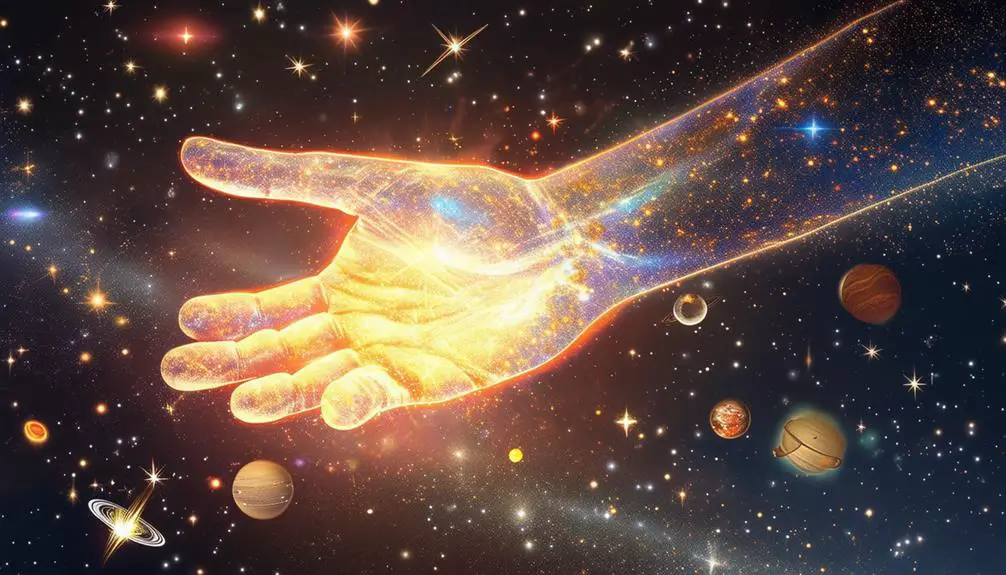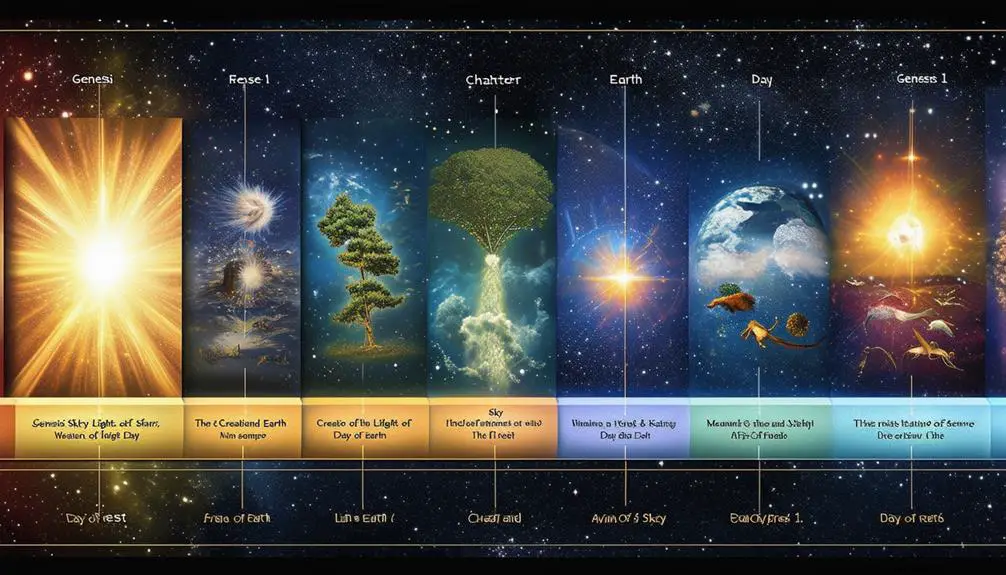Dive into Genesis 1 for a profound understanding of God's creation and mankind's divine responsibility, offering insights into life's ultimate purpose.

Bible Study – The Book of Genesis – Chapter 1 – Summary and Analysis
In Genesis 1, you're introduced to the theological affirmation of a monotheistic God and His orchestrated creation. The narrative reflects divine values throughout its rhythmic pattern across seven days, demonstrating God's ultimate authority. Simultaneously, it prompts you to appreciate mankind's responsibility for earth stewardship. Considering its historical, cultural, and linguistic contexts can further enhance your comprehension. Contemplating this systematic disclosure of divine intention and power will certainly offer you deeper insights into life's ultimate purpose as outlined in this seminal biblical chapter. Get ready to immerse deeper, an enriching spiritual understanding awaits.
Key Takeaways
- Genesis 1 presents an orderly, seven-day creation narrative, reflecting divine order and systematic approach.
- The narrative counters naturalistic explanations by asserting God as the orchestrator of the cosmos.
- The chapter underscores humanity's responsibility of earth stewardship and dominion, indicating moral implications.
- The concept of Sabbath symbolizes God's completed creation and establishes a pattern for humanity.
- The text invites comparisons with scientific theories, sparking dialogues between faith and science.
Understanding Genesis Chapter 1

In order to understand the profound depth of Genesis Chapter 1, you'll need to explore its historical context, theological implications, and literary structure. Diving into the domain of Genesis interpretations, you'll find a plethora of ideas and theories that have evolved over centuries. You'll encounter traditional Jewish and Christian interpretations dating back to antiquity, as well as more modern, critical perspectives shaped by historical and scientific discoveries.
The historical context is crucial; it illuminates the worldview of the ancient Israelites, giving you insight as to how they perceived the universe and their place within it. You'll understand that Genesis was written not as a scientific exposition, but as a theological affirmation of their faith in a monotheistic God.
The theological implications are vast. Genesis 1 lays the groundwork for Biblical allegories, themes, and doctrines that run throughout the Scripture. It presents a God who is not just a distant creator, but an intimate, involved sustainer. It portrays a world that, while fallen, is inherently good because of its divine origin.
Lastly, the literary structure of Genesis 1, with its recurring phrases and rhythmic patterns, adds depth and meaning to the narrative, hinting at the careful and deliberate nature of creation.
The Creation Narrative Analyzed
Having studied the foundational elements of Genesis Chapter 1, let's now turn our attention to an in-depth examination of the Creation narrative itself. We'll focus on two key aspects: Creation ethics and Divine aesthetics, both central to understanding this remarkable narrative.
- Creation Ethics: Genesis 1 portrays the ethical model of creation, where God brings the universe into existence through His spoken word. It suggests a moral framework for our own creative endeavors, emphasizing the value of thoughtfulness, intention, and respect for the interconnectedness of all life.
- Divine Aesthetics: The narrative also presents a divine sense of aesthetics. God creates with balance, purpose, and beauty – and declares it 'good.' This offers a perspective on the intrinsic beauty and purpose in the world around us.
- Pattern and Structure: The narrative unfolds over seven days, demonstrating a divine predilection for order and rhythm. This pattern echoes throughout the rest of Scripture, symbolizing completion and perfection.
In these ways, the Creation narrative is not merely an account of the world's origin. It's a reflection of divine values, a guide for ethical creation, and a demonstration of the inherent beauty in creation.
Key Themes in Genesis 1

In your examination of Genesis Chapter 1, you'll discover two key themes: the orderly progression of creation and dominion over Earth. You'll notice that creation isn't haphazard, but unfolds in a systematic and deliberate manner. Additionally, the theme of dominion over Earth elucidates the unique position of humans in the creation story, a position of responsibility and stewardship.
Creations Orderly Progression
You'll notice a clear, methodical progression in God's creation as outlined in Genesis 1, reflecting not just a sense of divine order but also a strategic design. This can be seen in the Creation's chronology, where each day builds upon the last, preparing a habitat before its inhabitants.
- Day one's light was necessary for day four's luminaries.
- Day two's atmosphere and sea were essential for day five's birds and fish.
- The dry land and vegetation of day three set the stage for day six's land animals and, ultimately, humanity.
Elemental symbolism is also prevalent, with the creation of light, water, earth, and sky all holding deep spiritual significance. This orderly progression highlights a God not of chaos but of calculated, purposeful action.
Dominion Over Earth
Among the key themes in Genesis 1 is mankind's dominion over the earth, a concept that's deeply embedded within the narrative and particularly stands out in the final act of God's creation. This portrays a clear animal hierarchy, with mankind at the pinnacle, entrusted with the responsibility of earth stewardship. God's directive to "subdue" and "have dominion over" the earth (Genesis 1:28) is not a call for exploitative dominion, but responsible stewardship. This includes caring for and preserving the earth and its creatures. It's a task with which you're charged, an assignment that calls for wisdom and restraint. Understanding the original intent behind these commands allows for a more holistic appreciation of this divine mandate and its implications for environmental ethics today.
Deciphering Biblical Symbolism
Decoding biblical symbolism isn't just about understanding the language of the Bible, it's about delving into the heart of its complex, multilayered narratives. You're not just reading words on a page, you're peeling back layers of symbolic language and Biblical metaphors that can offer profound insights.
Firstly, let's discuss some key concepts:
- Symbolic Language: This is the use of words and phrases to represent something beyond their literal meaning. Often, it offers a deeper, spiritual understanding.
- Biblical Metaphors: These are figures of speech where a word or phrase is applied to an object or action to which it isn't literally applicable.
To truly decipher Biblical symbolism, you need to:
- Understand the historical and cultural context of when the Bible was written.
- Interpret the Bible metaphorically, not just literally.
- Analyze the text within the broader context of the Bible's overall message.
This analytical, scholarly approach can reveal a deeper understanding of the Bible, its teachings, and its relevance for your life today. Remember, it's not just a historical document, but a rich tapestry of spiritual insights and wisdom.
The Role of God in Creation

In understanding Genesis Chapter 1, you must consider the unbounded power of God as the orchestrator of creation. You're invited to contemplate not only the purpose of divine creation, but also how this celestial act has fundamentally shaped humanity. This analysis will guide you towards a deeper comprehension of the tapestry of existence, as weaved by the hands of the divine.
God's Power in Creation
Exploring the vast depth of Genesis Chapter 1, you'll find a profound demonstration of God's power in creation, a proof of His omnipotence and supreme authority over all existence. This power is not only evident in the grand scale of creation but also in its intricate details, showcasing the Creative Dynamics and Divine Aesthetics of His work.
- God spoke things into existence, a validation of His sovereign power.
- The order and purpose in creation reflect His wisdom and forethought.
- The beauty of creation, from the stars in the sky to the creatures on earth, displays His Divine Aesthetics.
God's power in creation is not only about the ability to create but also reflects His character and nature. As you investigate further, you'll see a God who is not only powerful but also wise, purposeful, and aesthetically inclined.
Purpose of Divine Creation
While you've seen the power and aesthetics of God in creation, it's equally important to understand His purpose and role in this grand design. God didn't merely create out of whim, but with an intricate Divine Design, which underscores His sovereignty and wisdom. This Creation Purpose was not an arbitrary act, but a deliberate one, reflecting God's desire for a world where His creation could exist, interact and prosper. This purposeful approach elucidates God's role as a meticulous planner and executor. Every particle, every creature, and every star in the cosmos exists as a testimony to this Divine Design, signifying a Creation Purpose that is both profound and purposeful. Understanding this gives us a deeper insight into God's majestic role in creation.
Creation's Impact on Humanity
Delving into the significance of God's creation, you'll find that its impact on humanity is vast, shaping not only our physical environment but also our spiritual and moral landscapes. This divine creation plays a central role in the 'Human Evolution Debate', challenging us to reconcile our scientific understanding with religious teachings.
- It posits a Creator, countering purely naturalistic explanations of our existence.
- It provides a basis for moral law, situating us within a broader, divine context.
- It imbues life with purpose, enriching our understanding of the world and our place in it.
The 'Spiritual Implications' are profound, creating a framework for understanding our relationship with the divine. God's creation, then, is not an abstract concept but a foundational element of our human experience.
Day-by-Day Creation Summary

In the heart of Genesis Chapter 1, you'll find a meticulous day-by-day breakdown of creation, a narrative that highlights the omnipotence and systematic approach of the Creator. This Creation's chronology, carefully outlined, demonstrates divine artistry and a masterful design.
On the first day, God creates light, separating it from darkness. The second day brings the formation of the sky, a firmament dividing the waters. The third day reveals dry land, the seas, and all vegetation. The fourth day introduces the sun, moon, and stars, cosmic bodies to govern time and seasons. The fifth day gives birth to all sea creatures and birds. The sixth day, then, ushers in land animals and finally, the human race. Each day concludes with God's approval, an affirmation of the goodness inherent in His creation.
This day-by-day account isn't merely a timeline, but rather a testament to the Creator's calculated approach and impeccable execution. Each day's work prepares the environment for the subsequent creations, showing a clear sequence and interdependence. Genesis 1, thus, showcases not just the events of creation, but the divine blueprint and masterful artistry behind it.
Comparing Genesis With Science
As we compare Genesis with modern science, you're encouraged to examine the creation narratives critically, not just religiously. There's value in considering how these ancient texts might align or contrast with contemporary scientific understanding. This juxtaposition may lead you to a deeper insight, and possibly reconcile your religious beliefs with scientific truths.
Genesis Vs Modern Science
You'll find an intriguing intersection when comparing the narrative of Genesis with modern scientific theories, one that invites a myriad of questions and sparks thought-provoking discussions. The scientific accuracy of Genesis has been a point of contention, leading to many creation controversies.
- Does Genesis align with the Big Bang theory?
- How does the Genesis account of creation juxtapose with evolution?
Analyzing Creation Narratives
Diving into the heart of Genesis, let's examine the creation narratives and their correlation, or lack thereof, with modern scientific theories. To begin with, you'll encounter Creation Controversies, in which the six-day creation timeline contradicts the billions of years presented by science. Next, you'll confront Interpretive Challenges. Here, you grapple with whether to read Genesis literally or metaphorically. Do 'days' signify 24-hour periods or denote metaphorical periods of time? Does the 'firmament' represent the sky or a solid dome, as ancient Near Eastern cultures believed? These complexities highlight Genesis as not merely a historical or scientific account, but a theological text, inviting us to ponder divine actions and purposes. Yet, they also provoke fascinating dialogues between faith and science.
Reconciling Religion and Science
Exploring the delicate balance between religion and science, it's important to investigate the comparisons and contrasts between the Genesis creation narratives and established scientific theories.
- The Genesis account is rich in metaphorical language, potentially allowing for interpretations that align with scientific understanding.
- Scientific miracles, such as the Big Bang theory, offer a scientific explanation to the universe's creation, yet don't necessarily negate a divine hand at work.
- Faith exploration often leads to questioning established beliefs, opening up possibilities for reconciliation between religious and scientific perspectives.
Understanding this balance deepens one's appreciation for both the mysteries of faith and the discoveries of science. By comparing Genesis with science, you're not compromising your faith, but enriching it through a deeper understanding of the world.
Interpretation of 'In the Beginning'
The phrase 'In the Beginning' holds deep significance, serving as a cornerstone to understanding Genesis' first chapter and offering a glimpse into the text's profound theological implications. This Beginning Conceptualization is not merely a chronological marker but a theological statement of God's preeminence over creation. It's a declaration that before the cosmos existed, there was God.
In the context of Biblical Cosmology, the beginning encapsulates the moment God initiated creation, bringing forth the universe from a formless void. It's an affirmation of God's omnipotence and supremacy, setting the stage for the ensuing narrative of creation. This interpretation breaks free from the confines of humanly perceptible time, offering a timeless dimension to the concept of beginning.
Given the Hebrew language's conceptual nature, the term 'beginning' is not limited to a start, but encompasses the whole process of creation. It's not just about the 'start' of creation, but the entirety of God's creative act. This understanding gives depth to the Genesis narrative, highlighting God's purposeful, orderly creation rather than a random, chaotic event.
The Meaning Behind the Sabbath

In your journey through Genesis, you'll find that the Sabbath isn't just about rest; it's a divine symbol of God's completed creation and a demonstration of His sovereignty. The Sabbath Observance is more than a religious practice; it's a recognition of God's power and a reminder of His perfect order.
The Sabbath Significance can be observed in three key aspects:
- It signifies God's rest after the work of creation, symbolizing perfection and completeness.
- It serves as a reminder of God's sovereignty, emphasizing that He is the source of all things and the ultimate authority.
- It sets a pattern for humanity to follow, encouraging rest and reflection on God's grace.
These aspects highlight the profound meaning behind the Sabbath. The Sabbath Observance isn't just a religious ritual; it's a powerful symbol of God's perfect creation, His sovereignty, and His grace. By observing the Sabbath, you acknowledge God's supreme authority and express gratitude for His grace. So, as you study Genesis, consider the deep significance of the Sabbath and its role in God's divine order. Remember, it's not merely about taking a day off; it's about recognizing and celebrating God's sovereignty and grace.
Lessons From Genesis Chapter 1
Diving into Genesis Chapter 1, you'll uncover valuable lessons that expand your understanding of God's nature and His divine plan for creation. This pivotal opening chapter presents Genesis morals in a detailed, yet intricate, manner, highlighting the Divine Order in the universe.
The first lesson you'll glean is the omnipotent nature of God. He speaks, and it comes to existence, demonstrating His absolute authority and power. It's a stark reminder of our finite capabilities and the infinite capabilities of the Divine.
Secondly, the chapter illustrates the Divine Order. Each creation day builds upon the previous, revealing a meticulously ordered universe. This Divine Order underscores God's wisdom and foresight. It also implies that there are no random occurrences in life but rather a well-ordered plan overseen by God.
Lastly, Genesis Chapter 1 teaches the inherent value of all creation. God repeatedly pronounces His creation as 'good', affirming its worth and purpose. This reinforces the moral lesson of respecting and valifying all lifeforms.
Frequently Asked Questions
Who Wrote the Book of Genesis According to Biblical Scholars?
You're asking about the authorship of Genesis, which is a topic of ongoing debate among scholars. Traditional belief credits Moses as the author, affirming Biblical authenticity. However, modern scholars propose the Documentary Hypothesis, suggesting Genesis was compiled by various authors over time. This theory considers different writing styles and perspectives within the text. It's a complex issue, reflecting the multifaceted nature of religious texts and their interpretation.
Whats the Significance of the Order of Creation in Genesis Chapter 1?
In Genesis chapter 1, the Creation Chronology's significance lies in its Divine Sequence. It's not merely about what was created, but the order it was made. You'll notice it moves from chaos to order, darkness to light, simple to complex. This isn't accidental; it reflects a thoughtful, purposeful Creator. It also underscores a key theme: God's authority and design in the universe. Every detail in this narrative has profound implications, inviting deeper exploration.
How Does Genesis Chapter 1 Influence Christian Beliefs About the Environment?
Genesis 1 influences Christian beliefs about the environment like a blueprint for divine stewardship. It's where you see God creating the earth, entrusting its care to humanity. This shapes your environmental ethics, suggesting a responsibility to preserve and protect. It's not just about using resources, but maintaining a balance, acknowledging this world isn't just ours, it's God's creation. This belief guides how you interact with, and care for, the environment.
Is There an Intended Audience or Specific Demographic for Genesis Chapter 1?
While Genesis 1 doesn't explicitly target a specific audience, it's clear that its symbolism and cultural impact reach a broad demographic. You'd find that its messages are aimed at anyone seeking spiritual understanding or insight into Christian beliefs. As a result, you could say it's intended for those open to exploring religious themes, regardless of their background or status. The universal themes in Genesis 1 make it accessible and relevant to all.
Are There Any Notable Differences Between Genesis Chapter 1 and Other Creation Stories?
Certainly, it is crucial to recognize notable differences between Genesis Chapter 1 and other creation stories. These 'Creation Variations' often arise from diverse cultural interpretations. Genesis presents a monotheistic creation, with a single God creating the universe systematically in six days. Other narratives may involve multiple deities, elements of conflict, or a less structured sequence of events. Examining these narratives in their cultural context is vital to fully appreciate their unique perspectives.



Sign up